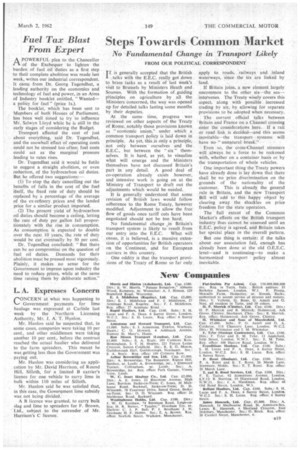Fuel Tax Blast From Expert
Page 55

If you've noticed an error in this article please click here to report it so we can fix it.
A POWERFUL plea to the Chancellor 11 of the Exchequer to lighten the burden of fuel oil duties as a first step to their complete abolition was made last week, writes our industrial correspondent. It came from Dr. Georg Tugendhat, a leading authority on the economics and technology of fuel and power, in an Aims of Industry booklet entitled, " Wanted— a policy for fuel ".(price Is.), The booklet, which has been sent to Members of both Houses of Parliament, has been well timed to try to influence Mr. Selwyn Lloyd.while he is still in the early stages of considering the Budget.
Transport affected the cost of just about everything, • said Dr. Tugendhat, and the snowball effect of operating costs could not be stressed too often; fuel costs could act as the marginal pressure leading to rates rises.
Dr. Tugendhat said it would be futile to suggest a straight abolition, or even reduction, of the hydrocarbon oil duties. But he offered two suggestions:—
(1) To stop the duty cancelling out the benefits of falls in the cost of the fuel itself, the fixed rate of duty should be replaced by a percentage of the average of the ex-refinery prices and the landed price for a similar product imported.
(2) The present yield of hydrocarbon oil duties should become a ceiling, letting the rate of duty per gallon fall proportionately with the rise in consumption. As consumption is expected to double over the next 10 years, the rate of duty would be cut eventually by 50 per cent.
Dr. Tugendhat concluded: But there can be no compromise on the question of fuel oil duties. Demands for their abolition must be pressed most vigorously. Plainly, it makes no sense for the Government to impress upon industry the need to reduce prices, while at the same time raising them by deliberate action."




















































































































































